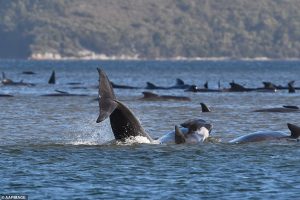Hundreds of pilot whales have been found beached on Tasmania’s west coast since Monday, in what is probably Australia’s largest stranding on record.
The BBC reports that while rescuers had managed to save 50, about 380 whales have died. Rescuers are trying to help the remaining estimated 30 whales.
According the BBC the Tasmanian government said the rescue effort would continue “as long as there are live animals”. Official, Nik Deka, said, “While they’re still alive and in water, there’s still hope for them – but as time goes on they do become more fatigued.”
Deka added they would now concentrate on removing the hundreds of carcasses scattered along the coast.
The BBC reports that the whales mainly washed up on sand pits in the water with the first rescuers on Monday having counted about 270 whales. On Tuesday, a helicopter spotted another 200 dead whales nearby, believed to be from the same pod.
Roughly 60 rescuers used equipment to help pull the whales off the sand banks, so they could be fully submerged in water. They were then guided back into deeper waters. However, a strong tide hindered efforts and caused some of the whales to be brought back to shore.
Meanwhile, Professor Peter Harrison of Southern Cross University’s Whale Research Group said without the buoyancy of the water, the whales would be slowly crushed by the weight of their own bodies. The BBC reports that pilot whales can grow up to 7 metres and weigh up to three tonnes.
Scientists suspect the whales became stranded after following fish to the shore and then becoming disorientated. Pilot whales are reportedly known for becoming stranded in clusters as they travel in large, close-knit groups.
Umm Muhammed Umar








0 Comments